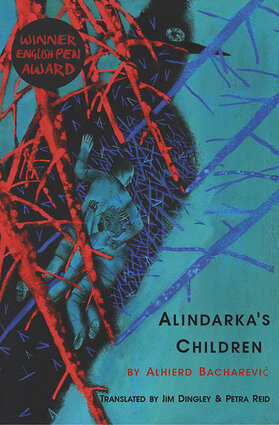Alicia and her brother Avi are interned in a camp where children are taught to forget Belarusian and to speak Russian, aided by the use of drugs as well as surgery on the larynx. They escape into the forest through a hole cut in the wire, but are pursued by the camp leaders and left to thrive for themselves in an adult Hansel and Gretel adventure.
Translated using English and Scots in place of Russian and Belarusian, this has clearly been a labour of love for everyone involved. Its success as a rendering of the original has been questioned by many reviewers, but read as a pure, dystopian fantasy this novel can’t fail to beguile and provoke.
Kafkaesque with elements of cyberpunk. — New Eastern Europe
Bacharevič’s novel blends the magic and darkness of a fairy tale with what is implicitly a manifesto on language and national identity.– “Kirkus Reviews”
Largely a meditation on what makes a language worth holding onto… Alindarka’s Children shifts lyrically between two languages, Belarusian and Russian, translated respectively and brilliantly into Scots and English. Readers will be stirred by Bacharevič’s ardent, earnest devotion.– “Publishers Weekly”
Bacharevič’s rich, provocative novel offers a kaleidoscopic picture of language as fairy-tale forest, as Gulag, as monument, as tomb, as everlasting life.–Sophie Pinkham “The New York Times”
A dark fantasy by one of Belarus’s most original contemporary writers. It captures the depths of frustration, grief, and resolve building up for decades under the deceptively placid surface of Belarusian life. Both a translation and a collage–an independent, multilingual literary work.–Jaroslaw Anders “The New York Review of Books”
You can take this book on many levels, from the philosophical and psychological analysis of what it does to a nation and a people to remove, control and suppress its mother tongue, to an exciting tale of two runaway children.– “The Scotsman”
To buy this book please send me a message.

